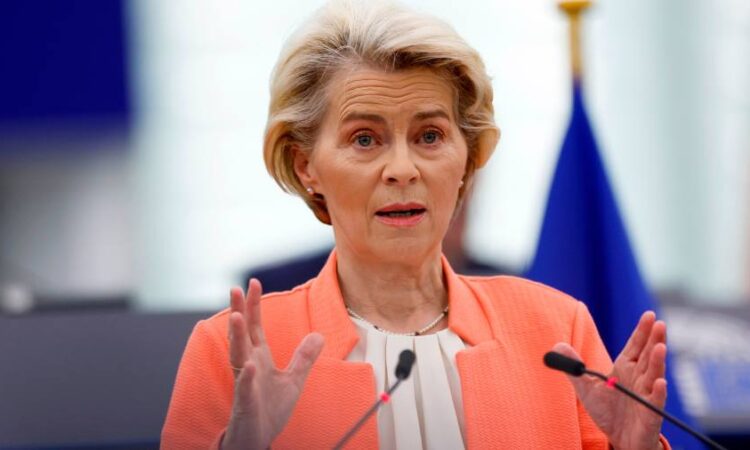
Receive free Electric vehicles updates
We’ll send you a myFT Daily Digest email rounding up the latest Electric vehicles news every morning.
Brussels will launch an anti-dumping investigation into Chinese electric vehicles that are “distorting” the EU market, a probe that could constitute one of the largest trade cases launched given the scale of the market.
European Commission president Ursula von der Leyen announced the probe in her annual address to EU lawmakers on Wednesday. “Global markets are now flooded with cheaper Chinese electric cars,” she said.
“And as we do not accept this from the inside, we do not accept this from the outside. So I can announce today that the commission is launching an anti-subsidy investigation into electric vehicles coming from China.”
European companies were “too often . . . excluded from foreign markets”, she said in the European parliament in Strasbourg. “They are often undercut by competitors benefiting from huge state subsidies.”
The investigation has been planned for months, and the EU’s concerns regarding China’s electric vehicle trade practices were conveyed by von der Leyen to Chinese premier Li Qiang in a bilateral meeting on the sidelines of the G20 summit in New Delhi last weekend, according to a person briefed on the discussion.
Shares in Chinese electric-vehicle makers sold off on the prospect of greater regulatory scrutiny from Brussels, with Warren Buffett-backed BYD falling about 2 per cent and rival Xpeng dropping almost 3 per cent. Other electric carmakers, including Great Wall Motor and Li Auto, were also lower following the announcement.
Action against Chinese carmakers in Europe has been demanded by member states, concerned that major domestic carmakers risk losing their leadership as the green transition reshapes the market.
The probe could constitute one of the largest trade cases launched as the EU tries to prevent a replay of what happened to its solar industry in the early 2010s when photovoltaic manufacturers undercut by cheap Chinese imports went into insolvency.
If found to be in breach of trade rules, manufacturers could be hit with punitive tariffs.
In the case of the solar industry, Brussels launched a tariff regime against imports of Chinese photovoltaic cells in 2012 but later scrapped the controls in order to boost installations of renewable power.
“This is an important move by the commission, signalling the willingness to use trade instruments more proactively to protect the European industry and avoid the replication of the solar panels failure experience in the past to the crucial car industry,” said Simone Tagliapietra, senior fellow at the Brussels-based think-tank Bruegel.
Chinese carmakers have made little secret of their ambitions to dominate Europe’s electric car industry, which is the largest electric vehicle market outside China.
BYD’s European boss Michael Shu previously told the Financial Times the marque intends to be in the top three brands by the end of the decade, and number one “if possible”.
Many of Europe’s largest carmakers have raised the alarm on Chinese imports, saying lower energy and labour costs give them an advantage over European models.
Peugeot owner Stellantis, the second-largest European carmaker, said it was considering building cheaper electric vehicles outside Europe and importing them, to compete with Chinese models.
The share of Chinese car brands in the EU market has increased from less than 1 per cent in 2021 to 2.8 per cent this year, according to Schmidt Automotive Research.
But in the electric vehicle market, Chinese manufacturers made 8 per cent of vehicles sold, according to automotive data analyst Inovev.
Von der Leyen used the address to lay out what the commission had achieved during her mandate ahead of EU-wide elections next year.
She also announced measures to improve access to finance and improve auction systems for the wind industry, which is struggling from similar competition from China, and promised to start dialogues with industry to streamline green legislation.
Europe also needed to “step up” on economic security, she said, in response to China’s own measures such as export controls on critical metals gallium and germanium.
Additional reporting by Peter Campbell in London






